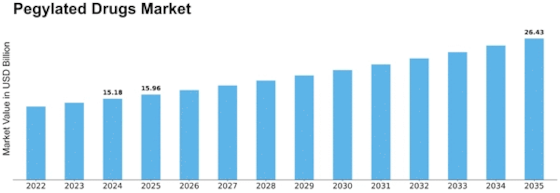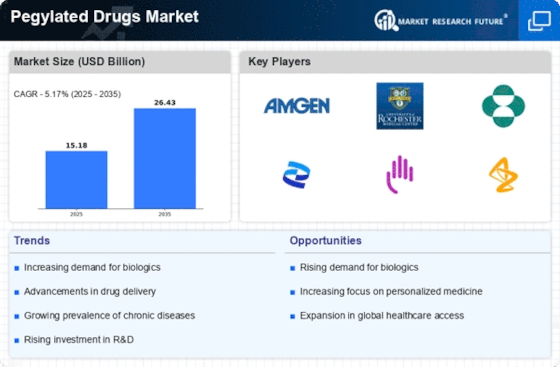Pegylated Drugs Size
PEGylated Drugs Market Growth Projections and Opportunities
PEGylated drugs represent an innovative approach to delivering medicines, providing various advantages that enhance the effectiveness of treatments. This technology involves modifying molecules such as proteins, peptides, enzymes, antibody fragments, and oligonucleotides by attaching chains of ethylene glycol, a process known as PEGylation. This modification brings about benefits like reduced degradation by enzymes and minimized immune responses, ultimately improving the therapeutic efficacy of drugs.
The primary goal of PEGylation is to increase the bioavailability of drugs during the pharmacological process, ensuring that the drugs reach their intended targets more effectively. Consequently, PEGylated drugs tend to exhibit a significantly more efficient impact in treating various medical conditions.
The global PEGylated drugs market is anticipated to experience substantial growth due to several factors. The rise in chronic diseases, especially cancer, plays a significant role, with PEGylated drugs being increasingly recognized for their effectiveness in such conditions. The pharmaceutical industry's continuous expansion and advancements in the biologics sector also contribute to the positive outlook for the PEGylated drugs market. However, challenges exist, notably adverse reactions associated with PEGylated drugs and instances of drug recalls, which may hinder the market's growth during the assessment period.
Looking at the market forecast, it is estimated that the PEGylated Drugs Market will reach a value of USD 5900.55 Million by 2030, with a compound annual growth rate (CAGR) of 10% during the forecast period from 2022 to 2030.
The segmentation of the global PEGylated drugs market is based on the type of molecules and the medical indications they target. In terms of molecules, the protein segment holds the largest market share, accounting for 64.80% in 2018, with a market value of USD 6,017.50 million. This segment is projected to register a CAGR of 5.84% during the forecast period. On the other hand, when considering medical indications, the cancer segment dominates, constituting 62.46% of the market share in 2018, with a market value of USD 5,799.52 million. This segment is expected to witness a CAGR of 6.10% during the review period.
The dominance of the protein segment underscores the significance of PEGylated proteins in the pharmaceutical landscape. These modified proteins exhibit enhanced stability and extended circulation time in the body, making them valuable for various therapeutic applications.
In the realm of medical indications, the prominence of the cancer segment highlights the crucial role PEGylated drugs play in oncology. The unique properties conferred by PEGylation, such as prolonged circulation and reduced immunogenicity, make these drugs particularly effective in targeting and treating cancer cells.
While the market outlook is positive, it is essential to address challenges associated with adverse drug reactions and recalls. These issues emphasize the importance of rigorous testing and monitoring throughout the development and commercialization of PEGylated drugs to ensure patient safety and maintain the market's integrity.




















Leave a Comment